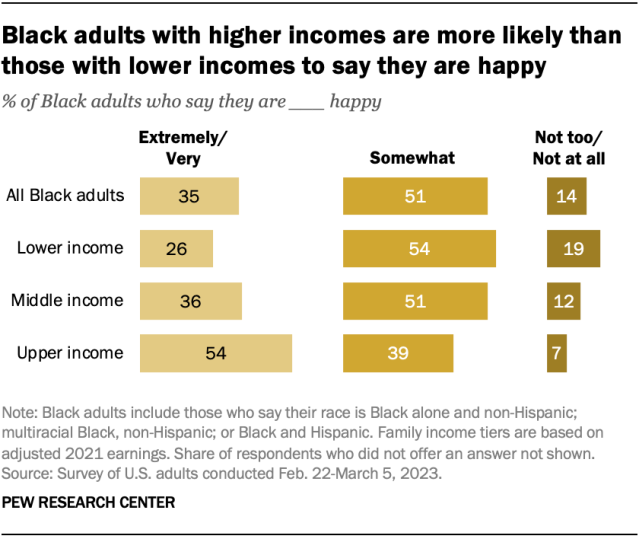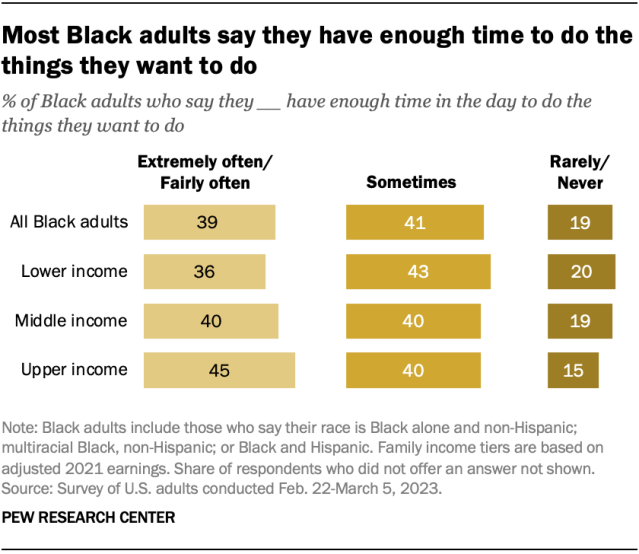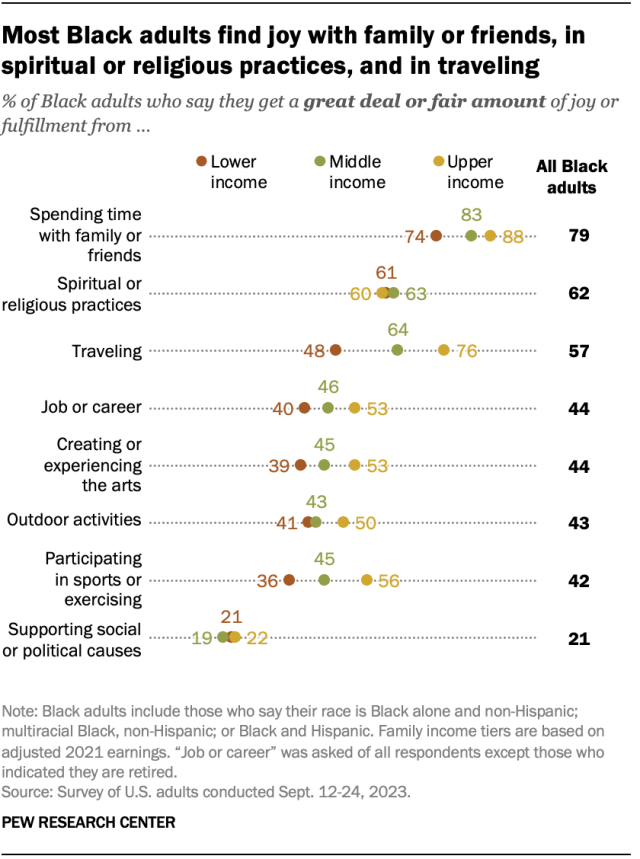
More than eight-in-ten Black adults say they are at least somewhat happy these days, according to a spring 2023 Pew Research Center survey of Black Americans. However, Black adults with upper family incomes (54%) are about twice as likely as those with lower family incomes (26%) to say they are extremely or very happy. Black adults with upper incomes also report having more time to do the things they enjoy.

At the same time, Black adults of all income levels find a great deal or fair amount of joy in similar things, according to another Center survey from September.
In recent years, we have surveyed Black Americans to better understand the connection between their finances and life satisfaction. We have also asked Black Americans about their views on capitalism and Black-owned businesses.
This analysis draws on two recent Pew Research Center surveys to examine Black Americans’ views on personal happiness and joy.
The first study was conducted among 4,742 Black Americans who identify as non-Hispanic, multiracial and non-Hispanic, or Hispanic from Feb. 22 to March 5, 2023. It includes 1,745 Black adults on the Center’s American Trends Panel (ATP) and 2,997 Black adults on Ipsos’ KnowledgePanel. This survey provided data on Black Americans’ assessments of their personal happiness and whether they have enough time to do the things they enjoy. For more on this survey, read its methodology and questionnaire.
The second study was conducted among 4,736 U.S. adults who identify as Black and non-Hispanic, multiracial Black and non-Hispanic, or Black and Hispanic from Sept. 12 to 24, 2023. It includes 1,755 Black adults on the ATP and 2,981 Black adults on Ipsos’ KnowledgePanel. This survey provided data on personal sources of joy and fulfillment. For more on this survey, read its methodology and questionnaire.
Respondents in each study are recruited through national, random sampling of residential addresses. Recruiting panelists by mail ensures that nearly all U.S. Black adults have a chance of selection. This gives us confidence that any sample can represent the whole population. For more information on random sampling, refer to our Methods 101 explainer.
To create the upper-, middle- and lower-income tiers, respondents’ 2021 family incomes were adjusted for differences in purchasing power by geographic region and household size. Respondents were then placed into income tiers: Middle income is defined as two-thirds to double the median annual income for the entire survey sample. Lower income falls below that range, and upper income lies above it.
Throughout this report, Black adults with upper incomes are those who have family incomes in the upper-income tier. Black adults with middle incomes and Black adults with lower incomes have family incomes in the middle- and lower-income tier, respectively. For more information about how the income tiers were created, read the methodology.
Black Americans and free time

In their daily lives, 39% of Black adults overall say they frequently have enough time to do the things they want to do. Another 41% say they sometimes have enough time, and 19% say they rarely or never have enough time.
However, those with upper incomes are more likely than those with lower incomes (45% vs. 36%) to say they have enough time to do what they want.
For decades, researchers have discussed a connection between income and happiness and suggest there is an association between having at least some – but not too much – free time and overall well-being. Our surveys found a similar association between being happy and having enough time. Black adults who say they have enough time to do the things they want (51%) are more likely to say they are extremely or very happy, compared with just 16% of those who say they rarely or never have enough time.
Where do Black adults find joy and fulfillment?

Across income levels, most Black adults find a great deal or a fair amount of joy or fulfillment in spending time with family or friends (79%), their spiritual or religious practices (62%), and traveling (57%), according to our September survey. Still, notable differences exist by income, particularly for activities that can cost money, like traveling, creating or experiencing the arts, participating in sports or exercising.
Here are some of the differences by income in the activities that bring Black Americans joy or fulfillment:
- Spending time with family or friends: Black adults with upper incomes (88%) are somewhat more likely than those with middle (83%) or lower (74%) incomes to say they find joy in this.
- Traveling: 76% of Black adults with upper incomes find joy in this, a higher share than among those with middle (64%) and lower incomes (48%).
- Creating or experiencing the arts: 53% of Black adults with upper incomes say this is a source of joy, compared with 45% of those with middle incomes and 39% of those with lower incomes.
- Participating in sports or exercising: 56% of Black adults with upper incomes say this is a source of joy, compared with 45% of those with middle incomes and 36% of those with lower incomes.
Note: For more on this survey, read its methodology and questionnaire.
